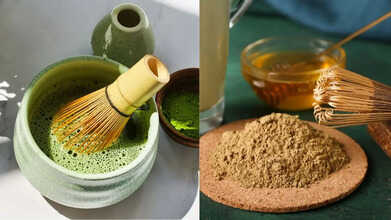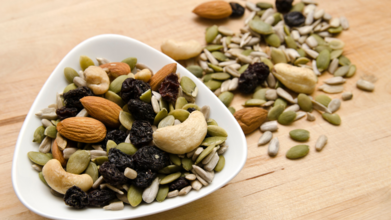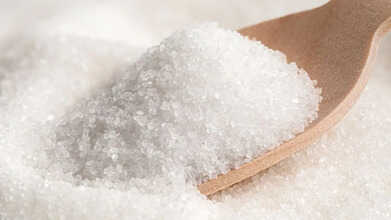- Health Conditions A-Z
- Health & Wellness
- Nutrition
- Fitness
- Health News
- Ayurveda
- Videos
- Medicine A-Z
- Parenting
- Web Stories
Eggnog May Be An Unexpected Source Of Protein And Antioxidants

Eggnogs For Protein and Antioxidants (Credit-Canva)
As the days shorten and temperatures drop, people are enjoying more eggnogs, a beloved seasonal treat, especially for those people who like how rich, creamy, and often spiced flavor it can be. The traditional preparation of eggnog involves raw eggs, and many people do not know this, that’s why it can raise concerns for some, while others may be unfamiliar with this classic beverage. Here are some potential health benefits that eggnog can offer. As healthy as homemade eggnog is, there are some ingredients that can make it unhealthy.
Nutritional Value of Eggnog
Homemade eggnog, unlike many commercially produced versions which are filled with preservatives and artificial ingredients, has a much better and more wholesome nutritional profile. This tasty drink has a base of eggs, milk, cream, and a blend of aromatic spices, and you will find how homemade eggnog provides several nutritional advantages. Eggs contribute a significant amount of protein, with approximately six grams per egg, making it a valuable source of this essential macronutrient. Milk and cream make it so much better because of the protein content while also supplying calcium, which is crucial for bone health, and other essential vitamins and minerals. The addition of spices like cinnamon and nutmeg introduces the antioxidant properties that eggnog has, further making the potential health benefits of this homemade beverage better.
What You Shouldn’t Add To It
While the core ingredients of homemade eggnog have a lot of nutritional value, the common practice of adding sugar significantly changes how its calorific value. The addition of sugar can effectively negate the anti-inflammatory benefits provided by cinnamon and nutmeg, diminishing the positive impact of these spices. High sugar intake is also linked to a range of health problems. These include an increased risk of heart disease, as highlighted in a 2014 study published in JAMA International Medicine. Excessive sugar consumption also worsens your risk of developing type 2 diabetes, contributes to unhealthy weight gain, and can even lead to fatty liver disease (steatosis), a condition that can progress to more severe liver issues like hepatitis, fibrosis, and ultimately, cirrhosis.
To make sure that there is no negative impact of sugar in eggnog, there are many things people practice. When preparing eggnog at home, it's advisable to minimize the amount of added sugar instead consider adding more cinnamon and nutmeg to enhance flavor without relying on excessive sweetness. When purchasing store-bought eggnog, carefully compare the sugar content between different brands and opt for options with lower sugar levels.
Why You Should Avoid Adding Alcohol To It
While most people make it without adding alcohol, it is a traditional practice in some recipes – however it adds a different set of health concerns. Similar to the effects of sugar, the addition of alcohol can negate the antioxidant benefits of the spices present in the beverage. Some people believe that alcohol has no calories and they can take as much of it as they want but alcohol contributes approximately 100 calories per serving, which can be a big concern for people who are monitoring their calorie intake for weight management or other health reasons. Beyond the amount of calories, alcohol consumption is associated with a range of negative health effects.
As reported by the National Institute on Alcohol Abuse and Alcoholism, alcohol can negatively impact various organs, including the heart, brain, oral cavity, lungs, liver, muscles, pancreas, bones, and intestines. While it is understandable why one would like to enjoy alcohol in their eggnog, especially during festive occasions, can be strong, opting for a non-alcoholic version offers a considerably healthier approach. By letting go of alcohol, people can enjoy the flavors and potential benefits of the base ingredients, such as the protein from eggs and dairy, and the antioxidants from spices, without the added risks associated with both sugar and alcohol consumption.
Matcha vs Hojicha: Which Tea Is Better For Your Health?

Credits: CANVA
When it comes to Japanese teas, Matcha and Hojicha often steal the spotlight, but they couldn’t be more different. One is vibrant and energising, the other warm and soothing. Beyond taste, both offer unique health benefits that can influence everything from your energy levels to your stress. So, which one deserves a regular spot in your cup? Let’s break down the perks of each and help you sip smarter.
Does Matcha Have Caffeine?Yes, matcha contains caffeine, and typically more than most green teas but less than coffee. According to Harvard Health, a standard 8-ounce cup of matcha contains 38–89 mg of caffeine, compared to 23–49 mg in regular green tea.
Matcha’s caffeine is paired with L-theanine, an amino acid known to promote alert, focused energy without the jitters often associated with coffee. As Lauri Wright, PhD, RDN, explains, “Matcha contains caffeine along with L-theanine, which is a combination known to promote alert, focused energy with less jitteriness.”
Does Hojicha Have Caffeine?
Hojicha, on the other hand, is roasted at high temperatures, significantly reducing its caffeine content. A 12-ounce cup of hojicha contains roughly 8 mg of caffeine, making it an ideal option for those sensitive to stimulants or seeking a relaxing evening beverage.
Energy Boost vs Relaxation: Matcha or Hojicha?
If you’re seeking an energising tea, matcha is the clear winner. Its higher caffeine content provides a natural boost, while the L-theanine helps maintain focus and reduce stress.
ALSO READ: Can Your Daily Matcha Cause Hair Loss? Expert Reveals
Hojicha may not energise like matcha, but research indicates it could offer anti-fatigue benefits, making it a gentle option for unwinding or maintaining steady energy without the spike. Manoj Sharma, PhD, notes, “Hojicha is a good option for those sensitive to caffeine.”
Matcha VS Hojicha: Antioxidants and Heart Health Benefits
Matcha stands out for its high antioxidant content, which can support heart health by lowering LDL (bad cholesterol), reducing plaque formation, and helping control blood pressure. Catechins, a class of antioxidants found in green tea, contribute to these effects.
Hojicha, being roasted, has a lower antioxidant concentration but still offers some health benefits. Both teas are believed to support anti-cancer, anti-inflammatory, weight management, and cognitive health, though matcha is generally considered more potent in these areas.
Which Tea Is Right For You?
Choosing between matcha and hojicha comes down to caffeine tolerance, daily routine, and personal preference:- Matcha: Best in the morning or early afternoon for energy, focus, and antioxidant support.
- Hojicha: Ideal for evenings or if you are sensitive to caffeine, providing a calm, soothing effect.
- Both: Enjoying matcha earlier in the day and hojicha later can maximize the health benefits and fit into your lifestyle seamlessly.
How to Incorporate Both Matcha and Hojicha Into Your Routine
Balancing Matcha and Hojicha in your daily routine can help you enjoy the unique benefits of both teas. Start your day with a cup of matcha to harness its caffeine and antioxidant boost, which can improve focus and support heart health. In the afternoon or evening, switch to hojicha for a low-caffeine, soothing option that helps you relax without affecting sleep. You can also experiment with different preparations, matcha lattes, iced hojicha, or blended teas to make it a sustainable and enjoyable part of your wellness routine.By enjoying matcha earlier in the day and hojicha later, you can maximise their complementary effects and tailor your tea intake to your lifestyle and wellness goals.
Not Chia Seeds, Gastrologist Reveals The Best Seeds You Should Have For Good Digestion

(Credit-Canva)
One thing we have all heard, whether from our friends, family or even dieticians on social media is how chia seeds are one of the best powerhouse foods that need to be in your diet to increase your fiber intake and digestion. While this is all true, are there no other seeds that help you get your health better?
Seeds are tiny powerhouses of nutrition, offering a wide range of benefits for your health. According to Dr. Saurabh Sethi, a gastroenterologist, incorporating certain seeds into your daily diet is an easy and effective way to boost your well-being. He highlights some of the most beneficial seeds and their specific health advantages.
For Digestion: Fennel Seeds
Fennel seeds are a real treat for your digestive system. They are full of fiber, which helps your gut work smoothly and prevents constipation. These seeds also have vitamins and minerals that can help get rid of bloating and gas, so you feel more comfortable after eating. You can add a small amount of fennel seeds to your water or simply chew on them after a meal to help with digestion.
For Hormonal Balance: Flax Seeds
Flax seeds are especially good for balancing your hormones. They contain compounds called lignans that help keep your hormone levels in check. This is particularly helpful for women, especially during different life stages like menopause. It's easy to add ground flax seeds to your morning smoothie, oatmeal, or even sprinkle them over a salad to get these powerful benefits.
For Omega-3s: Chia Seeds
When it comes to healthy fats, chia seeds are a superstar. They are packed with omega-3 fatty acids, which are incredibly important for your brain and heart. These healthy fats help reduce swelling in your body and can lower your risk of heart disease. Since most people don't get enough omega-3s, adding chia seeds to your diet is a simple solution. You can mix them into yogurt or soak them in milk to make a delicious pudding.
For Energy: Pumpkin Seeds
Need a natural energy boost? Grab some pumpkin seeds. They are loaded with magnesium, which helps your body create energy, and iron, which helps move oxygen to your muscles. This combination gives you steady energy throughout the day without the sudden crash that comes from sugary snacks. They make a great snack on their own or can be added to trail mix and granola.
For Bone Health: Sesame Seeds
Sesame seeds are great for building strong bones because they are packed with calcium. They also contain other important nutrients like magnesium and phosphorus that work with calcium to support your skeleton. Sprinkling sesame seeds on a stir-fry or salad is a simple way to give your bones the support they need
For Blood Sugar Control: Fenugreek Seeds
Fenugreek seeds are a hidden gem for managing blood sugar levels. They contain a type of fiber that slows down the digestion and absorption of carbohydrates, which helps prevent sharp spikes in blood sugar after you eat. For people with or at risk of diabetes, this can be very beneficial. You can soak them overnight and drink the water in the morning or add them to your cooking.
What Happens To Your Body When You Cut Sugar For 30 Days?

Credits: Canva
Sugar is everywhere in desserts, packaged snacks, drinks, and even foods we often think of as ‘healthy.’ While naturally occurring sugar in fruits is generally fine, consuming too much added sugar can harm your health. Studies link high sugar intake to obesity, type 2 diabetes, heart disease, and premature ageing. We understand that cutting sugar completely can feel impossible, but the benefits of reducing or quitting sugar are significant. To learn more, we spoke with Swati Mohapatra, Diet & Clinical Nutrition Expert at Manipal Hospitals Bhubaneswar.
What Happens To Your Body When You Cut Sugar For 30 Days?
Research shows that most Americans consume between 55–92 grams of added sugar daily. That equals about 13–22 teaspoons of table sugar and makes up nearly 12–16% of daily calories. This is far above the Dietary Guidelines for Americans, which suggest limiting added sugar to less than 10% of daily calories. The World Health Organization is even stricter, recommending under 5% for the best health outcomes.
ALSO READ: Chia Seeds vs Flax Seeds: Expert Reveals Which One Is Better For Your Heart
While reducing sugar isn’t easy, making the effort can lower the risk of chronic diseases and bring noticeable health improvements.
30 Days Without Sugar: Benefits
1. Faster weight reduction
Even without changing much else in your diet, cutting out sugar lowers hidden calorie intake, helping shed extra weight more quickly.
2. Lower risk of high blood sugar
Research suggests that reducing sugar helps maintain a healthy weight and keeps blood sugar levels stable.
3. Slower skin ageing
Keeping blood sugar within a healthy range may slow down skin ageing, helping you look younger for longer.
4. Reduced risk of falling sickCutting sugar lowers inflammation in the body and prevents new flare-ups, strengthening immunity and lowering susceptibility to infections.
5. Better appetite control
Balanced glucose levels support leptin, the hormone that regulates hunger cues. This helps reduce overeating and brings appetite back in check.
6. Higher energy levels
Replacing refined sugars with complex carbohydrates gives your body steady energy instead of quick crashes, leaving you more active throughout the day.
7. Stronger heart health
High sugar diets are linked to high blood pressure, inflammation, and greater risk of heart disease. Reducing sugar supports overall cardiovascular health.
Tips to Reduce Sugar Consumption
Completely giving up sugar might feel overwhelming, especially since it hides in so many everyday foods. The good news is that small, consistent changes can make a real difference to your health. By being mindful of what you eat and drink, you can gradually cut back on added sugars without feeling deprived. Here are some simple strategies that work:- Check labels for hidden sugar: Many packaged foods contain added sugars under different names. Reading labels helps you make better choices.
- Prioritise whole foods: Include more fruits, vegetables, whole grains, and lean proteins in your daily meals.
- Pick unsweetened options: Choose plain yogurt, unsweetened nut milks, or desserts without added sugar.
- Cut down on sugary drinks: Sodas, packaged juices, and energy drinks are some of the biggest sugar sources. Opt for water, herbal teas, or infused water instead.
- Reduce gradually: If you eat a lot of sugar, cut back slowly so your body adjusts more comfortably.
- Reach for healthier alternatives: Fresh fruit, a piece of dark chocolate, or homemade snacks can satisfy cravings in a healthier way.
© 2024 Bennett, Coleman & Company Limited

